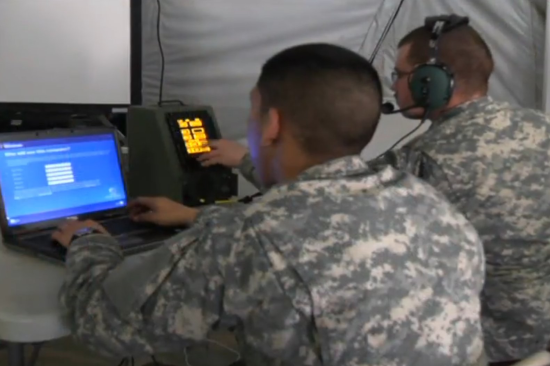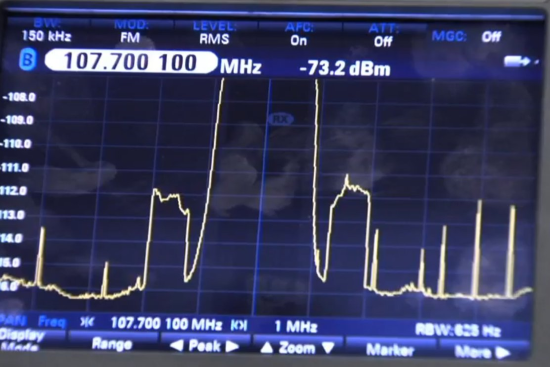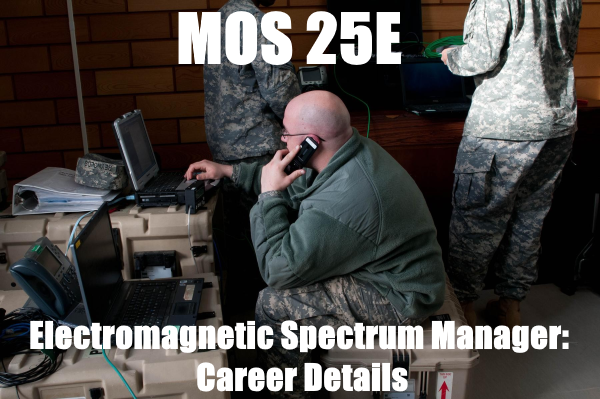An Electromagnetic Spectrum Manager (Army MOS 25E) is an essential career in the Army Signal Corps.
Soldiers in this Signal career field determine frequency requirements for units as well as assist in designing supportive communication networks.
Those who are assigned to MOS 25E must meet higher-level requirements, undergo specific training, and possess certain professional traits to succeed in this career field.
Here is a career profile for Army MOS 25E: Electromagnetic Spectrum Manager.
Related Article – 25 Series MOS: Army Signal Corps List
Table of Contents
Overview Of Army MOS 25E

In 2010, the Army established a new military occupational skill (MOS) 25E, Electromagnetic Spectrum Manager.
This position is available to non-commissioned Army officers.
The electromagnetic spectrum (EMS) is the range of all types of electromagnetic radiation, including:
- Radio waves
- Microwave
- Millimeter waves
- Infrared
- Visible light
- Ultraviolet light
- X-rays
- Gamma rays
The EMS is important to military operations in that it can detect actions and/or communications to protect against enemy activity, as such radiation energy travels and spreads out.
An Electromagnetic Spectrum Manager (ESM) manages electromagnetic spectrum databases at the division level and higher.
In addition, they facilitate obtaining spectrum support for users by working with appropriate federal, civilian, and host nation agencies.
Soldiers in MOS 25E are involved in the following:
- Resolving frequency interference incidents
- Reporting unresolved problems to higher headquarters
- Reviewing frequency interface databases for trending and/or repeating incidents
Role Of Electromagnetic Spectrum Manager
An Electromagnetic Spectrum Manager is not an entry-level position in the Army.
ESMs must hold the rank of staff sergeant, with less than 10 years of service.
The role of ESM is to provide advice and assistance to subordinate units as a means of successful mission accomplishment.
This also means advising the commander about any related electromagnetic spectrum management.
An ESM will prepare specific electromagnetic spectrum briefings for the commander and staff.
In addition, ESMs develop Army EMS management policy and procedures at the theater level and higher as well as oversee the career progression of other 25E personnel.
Related Article – Army MOS List: A List Of All 159 Army Jobs
Duties Of ESM

Electromagnetic Spectrum Managers are responsible for several important duties.
These NCOs (non-commissioned officers) perform network analysis to determine frequency requirements in addition to topographical and environmental analyses.
Such analyses assist in designing networks and engineering line of sight radio links.
In addition, ESMs maintain and update the frequency component of network charts, diagrams, and reports.
Unit-level maintenance on assigned communications and automation equipment is another essential duty they perform.
Here are some additional ESM duties:
- Use computer software programs to develop, produce, and distribute Signal Operating Instructions
- Maintain database of frequency requests and assignments
- Perform periodic reviews and updates
- Resolve frequency interference reports
- Maintain database of interference incidents
- Operate and perform preventive maintenance checks and services on assigned vehicles and power generators
Related Article – Army Signals Collection Analyst (MOS 35S)
Necessary Professional Traits For ESM
Clear and excellent professional and interpersonal communication skills are integral to the responsibilities of 25E personnel.
For example, frequency requests must be properly formatted and forwarded to appropriate military or civilian agencies for coordination and approval.
In addition, ESMs must maintain clear contact with such agencies.
Attention to detail is another necessary professional trait for Electromagnetic Spectrum Managers, especially in terms of software, network, and overall computer skills.
This trait allow for performing unlimited frequency planning, selection, and de-conflicting using automated tools.
It also enhances the ESM’s ability to perform field level maintenance on authorized signal equipment and associated electronic devices.
Requirements And Training For MOS 25E

For NCO (non-commissioned officer) soldiers wishing to advance their rank, changing MOS to 25E is an excellent opportunity.
However, since the 25E MOS is such a small group, it’s important to understand the requirements and training to successfully request reclassification to this specialty of the Army Signal Corps.
A candidate for Electromagnetic Spectrum Manager must meet a required ASVAB (Armed Services Vocational Aptitude Battery) score of 105 GT (General Testing) and EL (Electronics).
They must also have color vision (no color-blindness) and pass security clearance.
Security eligibility of “Secret” is required to be initially awarded MOS 25E.
Subsequently, soldiers must remain eligible to receive “Top Secret” security access to maintain this MOS.
Other requirements for Army MOS 25E include:
- Rank of staff sergeant (SSG) with less than 10 years of service
- SSG Advanced Leader Course (formerly BNCOC) graduate from MOS 25C, 25F, 25L, 25N, 25Q, 25P, 25S, or 25U
- Proficiency in reading, comprehending, speaking, and enunciating English language
- Completion of MOS 25E Course conducted at U.S. Army Signal School
Training for the ESM career field is located at the U.S. Army Signal School in Ft. Gordon, Georgia, and lasts just over nine weeks.
This formal training in the form of MOS 25E Course is mandatory unless a waiver is granted by the Commandant of the U.S. Army Signal School.
Options For Transitioning To Civilian Careers
There are many civilian careers related to Army MOS 25E.
Army veterans within the 25E MOS typically have extensive experience in managing the use of electromagnetic spectrum for signals and communications departments.
This experience is in demand outside the military as well.
Therefore, ESM soldiers would have several employment options in transitioning to the civilian sector.
Some of these potential civilian job positions include:
- Computer network support technician
- Computer programmer
- Graphic designer
- Camera operator
- Information technology professional
- Telecommunications specialist
- Radio mechanic
- Cable television systems professional
Electromagnetic Spectrum Managers who have served in the Army are also valued and marketable in the civilian job market for their ability to allocate and manage resources.
This is in addition to their often strong field-specific experience with electronics, spectrum usage, and maintenance of specialized field equipment.
Related Article – Army Radio And Communications Security Repair (MOS 94E)
Conclusion
Information technology is an essential component of the Army Signal Corps and the U.S. military as a whole.
Electronic, data, voice, and sight communications are integral to technical, tactical, and administrative mission success.
This includes secure communications, information systems, and global networks for coalition operations—all of which Signal Corps soldiers support and maintain.
Therefore, Electromagnetic Spectrum Managers within Army MOS 25E hold a significant position in the Signal career field.
Their determination of frequency requirements for units and design of supporting communication networks allows the Army to keep informed and ready to respond.
- Ikon Pass Military Discount: Learn How To Save Big - January 31, 2025
- RTIC Military Discount: Find Out How To Save Big on Gear - January 30, 2025
- Traeger Military Discount: Learn How To Save Big on Smokers - January 28, 2025


